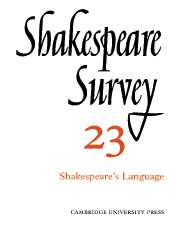Book contents
- Frontmatter
- Shakespeare and the Tune of the Time
- Some Functions of Shakespearian Word-formation
- Guide-lines for Interpreting the Uses of the Suffix ‘-ed’ in Shakespeare’s English
- Shakespeare’s Use of Colloquial Language
- Words, Action, and Artistic Economy
- ‘Antony and Cleopatra’: the Limits of Mythology
- Shakespeare’s ‘War with Time’: the Sonnets and ‘Richard II’
- Shakespeare and Christian Doctrine: Some Qualifications
- Shakespeare’s Poets
- The Text of Coleridge’s 1811–12 Shakespeare Lectures
- Shakespeare Studies in German: 1959–68
- A Neglected Jones/Webb Theatre Project: ‘Barber-Surgeons’ Hall Writ Large
- Interpretation or Experience? Shakespeare at Stratford
- 1 Critical Studies
- 2 Shakespeare’s Life, Times, and Stage
- 3 Textual Studies
- Index
- Plate section
Shakespeare’s Poets
Published online by Cambridge University Press: 28 March 2007
- Frontmatter
- Shakespeare and the Tune of the Time
- Some Functions of Shakespearian Word-formation
- Guide-lines for Interpreting the Uses of the Suffix ‘-ed’ in Shakespeare’s English
- Shakespeare’s Use of Colloquial Language
- Words, Action, and Artistic Economy
- ‘Antony and Cleopatra’: the Limits of Mythology
- Shakespeare’s ‘War with Time’: the Sonnets and ‘Richard II’
- Shakespeare and Christian Doctrine: Some Qualifications
- Shakespeare’s Poets
- The Text of Coleridge’s 1811–12 Shakespeare Lectures
- Shakespeare Studies in German: 1959–68
- A Neglected Jones/Webb Theatre Project: ‘Barber-Surgeons’ Hall Writ Large
- Interpretation or Experience? Shakespeare at Stratford
- 1 Critical Studies
- 2 Shakespeare’s Life, Times, and Stage
- 3 Textual Studies
- Index
- Plate section
Summary
It has been observed by more than one critic that the poets depicted, and the references to poetry, in Shakespeare’s plays seem to be by a man who regarded the art and its practitioners with irony, satire or contempt. But it is never safe to assume that Shakespeare shared the views of his characters, even of his virtuous characters; and the opinions expressed in his plays on the subject of poetry are all, in their various ways, suspect, because they are appropriate to the characters who speak them.
The earliest reference is in The Two Gentlemen of Verona, where Proteus instructs Thurio how to win Silvia. It must be remembered that Proteus is playing a double game since he wishes to win Silvia for himself. He is already false to Valentine and his advice to Thurio is insincere:
Butyou, Sir Thurio, are not sharp enough; You must lay lime to tangle her desires By wailful sonnets, whose composed rhymes Should be full-fraught with serviceable vows.
(iii, ii, 67-70)The Duke backs up Proteus' words with the remark:
Much is the force of heaven-bred poesy.
(iii, ii, 72)But the poetry advocated by Proteus is hardly heaven-bred: it is strictly utilitarian. Its object is the winning of Silvia, although Proteus does not wish it to succeed:
Say that upon the altar of her beauty
You sacrifice your tears, your sighs, your heart;
Write till your ink be dry, and with your tears
Moist it again, and frame some feeling line
That may discover such integrity.
(iii, ii, 73.7)- Type
- Chapter
- Information
- Shakespeare Survey , pp. 91 - 100Publisher: Cambridge University PressPrint publication year: 1970
- 1
- Cited by

